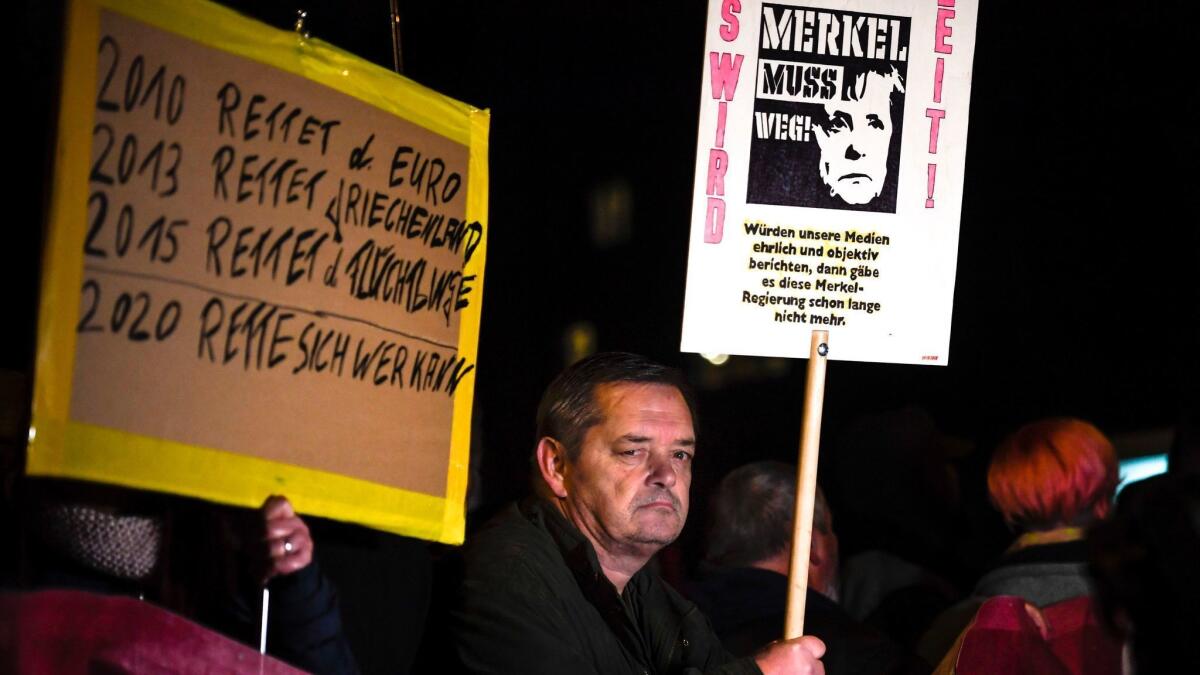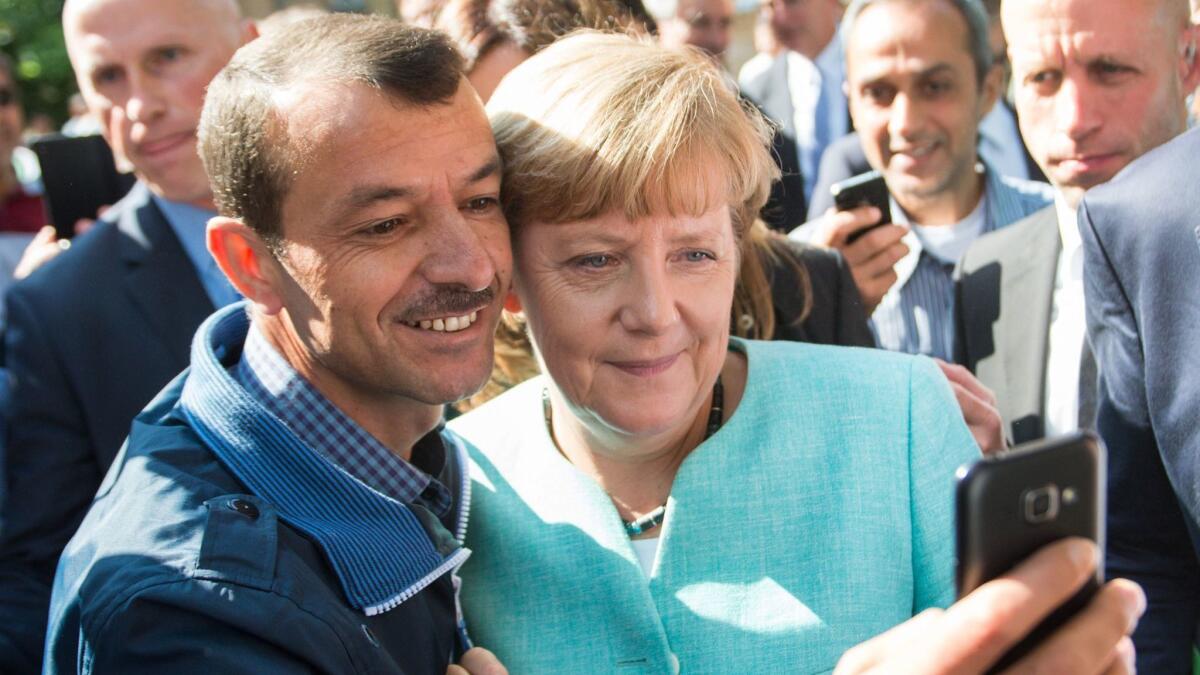German Chancellor Merkel set to give up party chair; refugee policy viewed by some as sore spot

- Share via
Reporting from Munich — Germany is showing signs of fatigue toward refugees after three years of a controversial open-borders policy by Chancellor Angela Merkel that drew more than 1.5 million people from Syria, Iraq, Afghanistan and other troubled nations.
The country took in more refugees during that period than the other 27 members of the European Union, the United States and Canada combined. It spends more than $30 billion per year for such services as state-financed apartments or shelters, healthcare and monthly cost-of-living allowances of up to $400 per person.
But the humanitarian approach by Merkel, arguably Europe’s most influential leader, put strains on Germany and resulted in tension with other members of the EU despite some signs of assimilation and entrepreneurship.
“What’s important is that Germany and other EU countries send signals that those who do not need asylum protection – in other words, a majority of those coming – should not even embark on these dangerous journeys because the chances of them being sent back home will be high,” said Gerald Knaus, director of the European Stability Initiative (ESI) in Berlin, a think tank.
Merkel, who announced in October under political pressure that she would relinquish control of her center-right party this week and not stand for another term as chancellor in 2021, has remained unapologetic about her September 2015 decision despite its having become a political liability. It helped fuel a populist far-right movement known as the Alternative for Germany (AfD) party that has siphoned away support from conservatives.
Critics say the benefits for newcomers amount to an incentive to go to Germany, with the cost-of-living allowance alone exceeding the minimum wages paid in many countries. The payments attract people looking to leave their homelands without legitimate grounds for gaining asylum, critics say, and enough is enough.
Enthusiasm for helping desperate and displaced people fleeing fighting, poverty and other issues has cooled considerably -- even though millions of Germans continue to wholeheartedly support refugees.
The initial outpouring of support that is summed up in the term Willkommenskultur, or culture of welcoming refugees, has since been replaced by hangover-like worries among Germans. Some fear that their magnanimity is being exploited by people from countries where there is neither war nor political persecution – basic grounds for obtaining asylum.

Syrians almost always receive asylum because of the more than seven years of fighting and devastation in their homeland. Many migrants from elsewhere manage to stay after their asylum claims are rejected under a murky “tolerated” status — leaving them in a legal gray area that makes it difficult to find work.
Knaus said public support for refugees genuinely in need of protection likely would remain high as long as those whose applications were rejected could be repatriated quickly.
There is growing unease – and statistical evidence to back it – that roughly two-thirds of those arriving since 2015 came in pursuit of a better life with no real chance of asylum. The influx boosted the fortunes of ed Alternative for Germany.
“Migration is not a human right,” said Beatrix von Storch, a deputy parliamentary leader for the AfD, which has become the largest opposition party with unabashedly anti-Muslim policies. “No border, no nation. We want to preserve our country. We can’t allow everyone to come in.”
Tapping into that vein of anti-immigrant sentiment also found in other EU countries, the AfD won nearly 13% of the vote in the 2017 federal election. In a country that largely scorns far-right movements following the horrors of its Nazi past, support for the AfD has grown to 15%, according to recent opinion polls.
Germany has been unable to repatriate many of those seeking asylum from countries in northern and sub-Sahara Africa as well as Pakistan and some parts of Afghanistan after their claims were rejected. Repatriations are slowed or foiled because of bureaucratic red tape and an elaborate system that allows for appeals. About 20% of those rejected later win asylum in appeals courts.
That inability to deport those deemed not eligible for asylum combined with a handful of violent crimes by newcomers and many lesser crimes has heightened angst about the possibility of more migrants — and the chance that Germany’s national identity might be altered.
“It was to be expected that we’d be facing more problems like rising crime rates when large numbers of mostly young men come to Germany without any real chance of obtaining asylum,” said Harald Pickert, inspector general of the Bavarian state police force.
Bavarian police say they have responded to calls at refugee centers more than 20,000 times so far in 2018 -- to break up fights between different ethnic groups or investigate crimes ranging from assault to theft, drugs violations and rape. The total number of crimes involving refugees and migrants has tripled to 40,109 cases in Bavaria alone — just one of Germany’s 16 states — in 2017 from 13,203 in 2014.
Karl-Heinz Kamp, president of the Federal Academy for Security Policy and a high-ranking government advisor, said many Germans were overly optimistic about the skills refugees were bringing with them when they swept into the country in 2015.
The flood of new arrivals has weakened the ruling Christian Democrats and especially Merkel, who has become a lightning rod of criticism for her can-do exhortations at the outset supporting the influx.
It also exposed fissures between Germany and other EU countries far less enthusiastic or even openly hostile about accepting refugees. contributed to Britain’s 2016 decision to leave the bloc and to Hungary, Poland and the Czech Republic refusing to accept EU plans to redistribute refugees across member countries.
The issue remains tough for Merkel, who could be forced out of office as chancellor sooner than she expects after she steps down Friday as chair of the Christian Democrats, a post she has held for 18 years.
A new party chair could engineer a change that would force Merkel’s exit as chancellor before her term ends in 2021. The candidates to succeed her as party chair include two arch-conservatives, Friedrich Merz and Jens Spahn, and Merkel’s pick, Annegret Kramp-Karrenbauer.
Many supporters of Merkel’s handling of the refugee and migrant crisis say the concerns by some in Germany have overshadowed the efforts’ success, as well as the fact that the number of new arrivals has fallen to fewer than 200,000 per year.
German companies large and small that had been struggling to fill vacancies have been delighted with the new arrivals. The federal labor office announced last month that a total of 306,574 asylum seekers had found jobs in Germany through mid-2018 -- a gain of 100,000 in the last year.
The Berlin Water Works utility has also been hiring a dozen refugees and migrants each year for their three-year training programs, officials said.
Some refugees have become successful entrepreneurs.
Yamn Molhem, a co-owner of a restaurant called Aldimashqi, said he started the business with two other refugees from Syria three years ago and they now employ 30 people — all Syrian refugees.
“We work as hard as we can,” Molhem said. “It’s going really well.”
Kirschbaum is a special correspondent.
More to Read
Sign up for Essential California
The most important California stories and recommendations in your inbox every morning.
You may occasionally receive promotional content from the Los Angeles Times.










